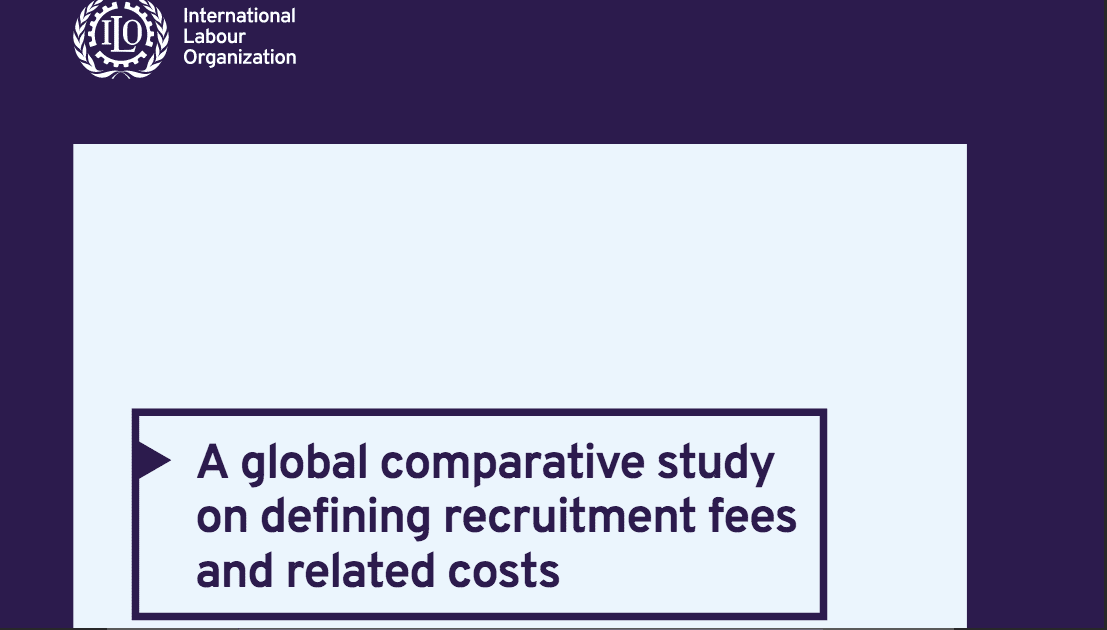
Global Study on Recruitment Fees and Related Costs
At the time of publication of this Global Study, the COVID-19 pandemic is having an enormous impact on workers’ mobility across borders, particularly due to the imposition of strict limitations on international travel. The unprecedented reduction in economic activity is critically impacting all workers, including migrant workers, putting them in economic peril, and endangering their health and psychosocial wellbeing. Nevertheless, countries and business are and will continue recruiting workers nationally and internationally, in particular into those sectors considered essential.1 While recruitment practices are adapting quickly to respect COVID-19 prevention measures, a grave concern is that the contraction of the global labour market will increase pressure on migrant workers to pay high recruitment fees and related costs as they are forced to “compete” for scare jobs abroad, particularly the low-wage jobs most often accessible to migrant workers. In this rapidly changing context during the crisis, the implementation of agreed international labour standards, in particular the ILO Employment Service Convention, 1948 (No. 88) and ILO Private Employment Agencies Convention, 1997 (No. 181), in addition to General Principles and Operational Guidelines on Fair Recruitment is essential.
Already prior to the pandemic, evidence has repeatedly shown that the payment of recruitment fees and related costs significantly increases the risk to workers of experiencing forced labour, debt bondage and human trafficking. The ILO has found that the “costs of coercion were approximately US$21 billion, with the total amount of underpaid wages estimated to be US$19.6 billion, with the remaining US$1.4 billion attributed to illegal recruitment fees” (ILO 2014b, 10). At the same time, recruitment costs are a significant subset of labour migration costs, and survey data has shown that recruitment costs can amount to nine months or more of average monthly earnings in some corridors (ILO 2017a, para. 166). As the COVID-19 pandemic continues to spread across the world, workers are now facing new challenges in their recruitment processes, but the issue of payment of recruitment fees and costs persists. Workers may no longer be able to be (re)deployed due to travel restrictions and delays in processing of documentation, with the obvious risk of losing their jobs. They may already have paid fees and costs related to their recruitment or deployment and face difficulties in obtaining reimbursements3. The analyses of laws and policies on recruitment fees and related costs presented in this Global Study can serve as a useful guidance and reference point while governments and social partners plan and implement the immediate and long-term response to COVID-19, including the prevention of abusive and fraudulent recruitment practices.
This global comparative study (Global Study) was concluded in order to advance the ILO’s work on promoting Fair Recruitment, in particular to reduce recruitment fees and related costs paid by workers. The ILO General Principles and Operational Guidelines for Fair Recruitment provide a definition of “recruitment fees or related costs”, as “any fees or costs incurred in the recruitment process in order for workers to secure employment or placement, regardless of the manner, timing or location of their imposition or collection”. Principle 7 expressly prohibits the charging of these fees and related costs to workers. Given the absence of a globally accepted “definition of fees and related costs”, the experts participating at the Tripartite Meeting of Experts that adopted the ILO General Principles and Operational Guidelines on Fair Recruitment suggested the subject was something that future work by the ILO might make more precise. The Office was subsequently mandated to convene a tripartite meeting of experts in order to review, amend and adopt draft definitions on recruitment fees and related costs based on a global comparative study (ILO 2017c).
Read more here.
